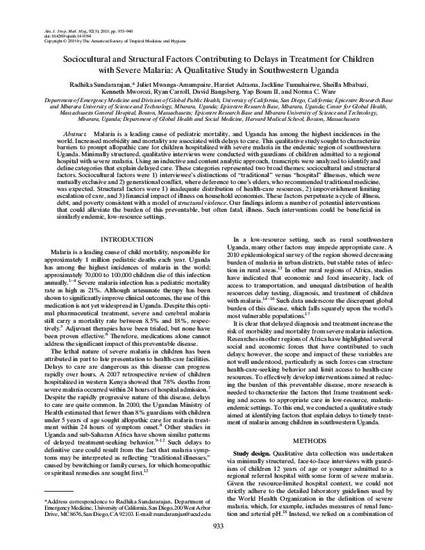
- Malaria in children -- Treatment -- Uganda -- Qualitative studies,
- Malaria in children -- Social aspects,
- Malaria in children -- Effect of delays in treatment on
Malaria is a leading cause of pediatric mortality, and Uganda has among the highest incidences in the world. Increased morbidity and mortality are associated with delays to care. This qualitative study sought to characterize barriers to prompt allopathic care for children hospitalized with severe malaria in the endemic region of southwestern Uganda. Minimally structured, qualitative interviews were conducted with guardians of children admitted to a regional hospital with severe malaria. Using an inductive and content analytic approach, transcripts were analyzed to identify and define categories that explain delayed care. These categories represented two broad themes: sociocultural and structural factors. Sociocultural factors were 1) interviewee’s distinctions of “traditional” versus “hospital” illnesses, which were mutually exclusive and 2) generational conflict, where deference to one’s elders, who recommended traditional medicine, was expected. Structural factors were 1) inadequate distribution of health-care resources, 2) impoverishment limiting escalation of care, and 3) financial impact of illness on household economies. These factors perpetuate a cycle of illness, debt, and poverty consistent with a model of structural violence. Our findings inform a number of potential interventions that could alleviate the burden of this preventable, but often fatal, illness. Such interventions could be beneficial in similarly endemic, low-resource settings.

At the time of writing, David Bangsberg was affiliated with Massachusetts General Hospital, Center for Global Health.
Originally appeared in the American Journal of Tropical Medicine and Hygiene, vol. 92, no. 5, 2015; © 2015 by American Society of Tropical Medicine and Hygiene
This is an open-access article distributed under the terms of the Creative Commons Attribution License, which permits unrestricted use, distribution, and reproduction in any medium, provided the original author and source are credited.